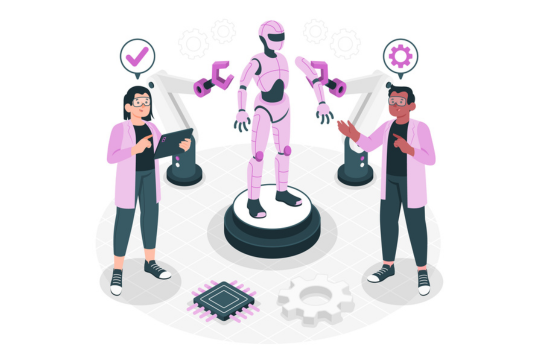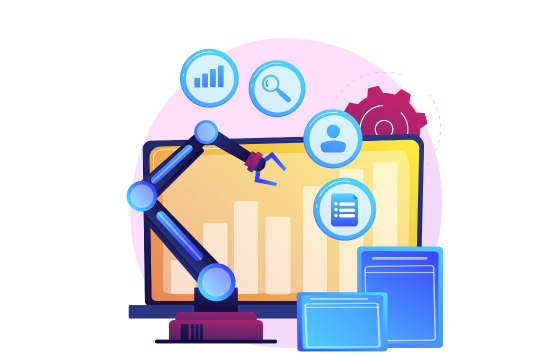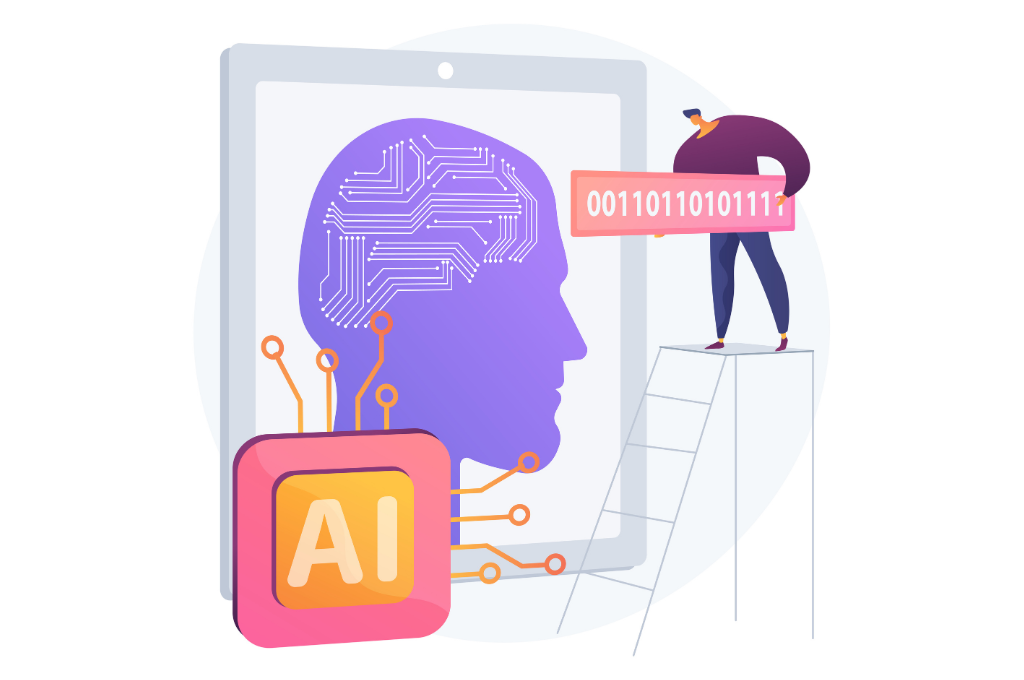In today's expeditious business environment, leveraging the most sought-after technologies helps startups gain a competitive edge. Artificial intelligence can optimize business processes, streamline operations, and create personalized customer experiences. Custom software development for small businesses plays a pivotal role in integrating such advanced technologies seamlessly However, integrating AI into a startup's functions can be overwhelming and challenging. This post will dive into what AI is and give you seven essential tips of practical insights and strategies to implement AI into your startup business and reap its benefits.
What Exactly Is Artificial Intelligence?
Artificial intelligence describes any computer program or algorithm that can be taught to do tasks usually done by humans. Its core components are learning, reasoning, problem-solving, perception, knowledge representation, and language understanding.
- Learning - AI systems can learn and adapt to changes in their environment. It includes understanding concepts, retaining information, solving problems, and making decisions based on past experiences.
- Reasoning - AI systems can reason by analyzing data from multiple sources and making predictions or recommendations. They can also use logical reasoning to interpret visual data or facts to conclude.
- Problem-Solving - AI systems can solve complex problems by breaking them into smaller sub-problems and applying suitable techniques.
- Perception - AI systems can understand visual, audio, and other sensory inputs, process them and make sense of the data.
- Knowledge Representation - AI systems can store, organize, retrieve, and use data for further reasoning and problem-solving.
- Language Understanding - AI systems can understand natural language, allowing them to interact with human users more naturally.

The greatest strength of AI and machine learning technology is its ability to learn from data. By analyzing vast amounts of data, AI algorithms can identify patterns, make predictions and automate decision-making processes. It can revolutionize businesses' operations by increasing efficiency and accuracy, reducing costs, and improving customer experiences.
It can make recruiting easier, whether it's for tech jobs or other industries, by automating the screening of resumes and identifying the most qualified candidates based on historical hiring data. This not only saves time but also helps eliminate biases in the hiring process, fostering a more diverse and inclusive workforce
However, there are challenges associated with implementing AI in business settings. The common challenge for businesses is the need for high-quality data. AI is trained with a set of data, and here's where companies struggle. They find giving the AI algorithm the right and relevant information challenging. As a result, there will be variations and inconsistencies when operating AI systems. Artificial intelligence is useful for many purposes
7 Tips on How to Effectively Leverage AI for Startup Business
As AI is expected to have an annual growth from 2020 and 2027 of 33.2%, there are no reasons why we, as startups, don't engage with AI. According to a TechJury article, 35% of companies are using AI, and 42% are exploring future AI implementation. Additionally, 95% of leading businesses have invested in AI in the past or are currently ongoing.
As startups, it may be different - but you can leverage AI for your business with the following tips.
Tip #1. Define your business goals and objectives.
According to Forbes, AI should have a goal and objective. It should not be just because of merely leveraging technology or a "solution with no problem." There should be a reason behind investing the startup funding and valuable time and energy in this technology, or it will be a big waste of resources.
Defining business goals and objectives is crucial before implementing any AI initiatives. You must clearly define these goals and objectives to achieve your desired outcome. AI initiatives that properly align with business objectives can increase efficiencies, reduce costs, and improve customer satisfaction. If your business objective is to improve customer experience, AI-powered chatbots can be implemented to provide 24/7 customer support. Even the event industry is leveraging AI-powered chatbots for registration platforms to handle queries and concerns.
Key takeaway: Artificial intelligence should not be used as an end goal but as a tool to achieve your business objectives. Aligning AI initiatives with business goals will increase the chances of success and help measure the ROI of AI implementation.
Tip #2. Map out your processes.
Mapping out processes gives companies a better understanding of their business processes and operations and allows continuous improvement. By mapping your business processes to AI & machine learning algorithms, AI can automate faster and more accurate process mapping. You can identify repetitive and time-consuming tasks, which can be automated using AI-powered tools. It helps reduce the workload on human employees and improves the accuracy and speed of completing tasks.
Implementing AI in your business process mapping allows you to see hidden problems that humans might not notice or predict. AI can find potential problems by scanning historical data and patterns. It helps you address the issue before it becomes a significant cause.
Key takeaway: Mapping out your processes helps identify areas where AI can be integrated, allowing automation and machine learning for accuracy and efficiency.

Tip #3. Identify AI applications specific to your processes, goals, and objectives
Identifying AI applications specific to your business processes, goals, and objectives is essential for successful implementation. Here are quick steps on how to identify AI applications specific to your business processes, goals, and objectives:
- Identify pain points in your current processes: Look for areas of your business that could benefit from automation or optimization.
- Define your goals and objectives: Establish what you want to achieve by implementing AI technology.
- Research potential AI solutions: Research available AI technologies to help solve your identified pain points and align them with your goals and objectives.
- Evaluate potential solutions: Test different solutions to see which ones work best for your business processes and align with your goals and objectives.
- Prioritise implementation: Determine which solutions will significantly impact your business and prioritize their implementation accordingly.
- Monitor and adjust: As with any new technology implementation, monitoring progress and adjusting as needed is essential to ensure continued success.
It's crucial to select best AI tools and platforms that are suitable for your startup's needs. Popular AI tools, such as an AI logo maker or presentations created with AI, provide access to pre-built templates that can be customized to meet your unique business requirements. Another example is Hyros, a sophisiticatedlAd tracker and AI optimisation tool for high level digital businesses. Additionally, some advanced tools integrate specialized features, like iPhone noise cancellation, ensuring a seamless and tailored experience for users. However, it's essential to carefully evaluate these tools' features, cost, and compatibility before selecting one.
One successful implementation of AI tools is by a financial startup called ZestFinance. They use machine learning algorithms to analyze data and determine credit scores for individuals with little to no credit history, providing a solution for underbanked communities. It helps lenders effectively predict credit risk to increase revenues, reduce risk and ensure compliance.
Key takeaway: Identify specific areas where AI can be applied in your business processes and goals to increase efficiency and accuracy. Carefully evaluate and select appropriate AI tools and platforms for your startup's needs. Look at successful AI tool implementations for inspiration and ideas.
Tip #4. Collect quality data.
Data is the foundation of any AI model, and the data quality directly impacts the accuracy of the model's predictions. High-quality data ensures that AI models can make accurate decisions and identify patterns and trends correctly.
According to the McKinsey survey, 24% of the surveyed 100 companies need more precise strategies for sourcing the data that AI requires. Businesses must develop a robust data collection strategy that ensures the data is relevant, accurate, and reliable. Here are some strategies for collecting and managing data effectively:
- Identify the data requirements: Determine the needed data type to achieve your business goals and objectives.
- Start with a small sample size: Collect data in small batches and gradually increase the data you collect as you refine your strategy.
- Implement data validation procedures: Validate the collected data to ensure it is accurate and complete.
- Cleanse the data: Remove incomplete, irrelevant, or wrong data to improve the data quality used in the AI model.
- Protect sensitive information: Ensure collected data complies with privacy laws and regulations.
- Use automation tools: Utilise data capture forms, data analysis software, and data management systems to streamline the data collection process.
- Continuously update and maintain data: Regularly update and maintain the collected data to ensure that the AI model remains accurate and relevant.
Key takeaway: Businesses should implement a robust data collection strategy that includes identifying data requirements, starting with small sample sizes, implementing data validation procedures, cleansing the data, protecting sensitive information, using automation tools, and continuously updating and maintaining data.

Tip #5. Use Generative AI for creating stories or images
Generative AI refers to AI models that create original stories and images that should be used to promote the startup business. It will give the business more visibility online and generate more interest from potential customers.
One popular tool for generating content is chatGPT, which is trained on a large language model and can be prompted to create stories, ad copy, or articles. However, when utilizing chatGPT content, it is essential to fact-check the generated material to ensure accuracy and avoid any potential legal or ethical issues. It’s a good idea to run the content through an undetectable AI writing tool to ensure it’s humanized content before publishing.
In addition, tools such as Dall-E and Midjourney can generate images. These tools allow users to create anything they want, and Bing has made this process easily accessible through its image creation feature.
Key Takeaways: You can use Generative AI product ideas to create original content such as stories, images, logos, infographics, and video advertisements for businesses. ChatGPT is a popular tool for generating written content, but it should be fact-checked to ensure accuracy and avoid legal or ethical issues. Tools like Dall-E and Midjourney allow users to create custom images to promote their business.
Tip #6. Automate business processes with AI.
AI can automate data entry, customer support, and financial management. For example, an AI-powered chatbot can answer customers' frequently asked questions, freeing customer support staff to focus on more complex queries.
Moreover, AI can analyze large amounts of data more accurately and faster, leading to better decision-making. It can also predict future trends and identify potential issues before they arise, allowing startups to take proactive measures.
Many startups have already started leveraging AI for process automation. For instance, UiPath is an AI-powered robotic process automation tool that helps automate repetitive tasks such as data entry, invoicing, and payroll management. Another example is Xero, an AI-powered accounting software that automates financial management tasks such as invoice generation and expense tracking.
Key Takeaways: AI can automate various business processes such as data entry, customer support, and financial management, among others, freeing up human resources for more complex tasks. Tools like UiPath and Xero are examples of AI-powered software that can automate tasks such as data entry, invoicing, and financial management.

Tip #7. Use AI technology for customer engagement.
By leveraging AI, startups can enhance their customer engagement and personalization, thus improving customer experience and building brand loyalty. AI-powered chatbots, recommendation systems, and sentiment analysis tools are some ways to achieve this.
One way to apply AI-driven customer engagement strategies is by using chatbots. Chatbots can respond instantly to customer queries, saving time and effort while providing 24/7 customer support. Additionally, they can use customer service apps to provide personalize interactions based on previous customer behavior, improving customer satisfaction.
Another way is through recommendation systems. Recommendation systems use machine learning algorithms to analyze customer behavior and preferences and recommend products or services that match their needs. It leads to better customer engagement and increases the likelihood of repeat purchases.
Sentiment analysis tools are another powerful tool for enhancing customer engagement. Sentiment analysis uses natural language processing to analyze social media or review sites' customer feedback, providing insights into customer sentiment and identifying potential issues to be addressed.
Key Takeaways: AI technology offers a range of customer engagement opportunities. From chatbots and recommendation systems to sentiment analysis tools, startups can use AI to enhance customer engagement, personalize interactions, and build loyalty. AI-powered customer engagement strategies will pay off for any small business looking for success.
Final Thoughts: Future of AI in Businesses
Companies that leverage AI will have a significant advantage over their competitors, as they can automate processes, reduce costs, and make more informed decisions. If you're a startup or an existing business owner, now is the time to explore how AI can benefit your operations. Seek out those with experience in AI development and implementation to help you get started.






















